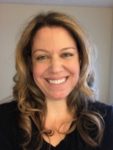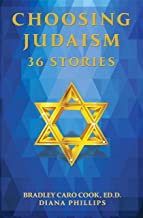Choosing Judaism: 36 Stories by Bradley Caro Cook, Ed.D., and Diana Philips; Growth Exponential Publishing, 2020;
By Heather Z. Rothstain

 IRVINE, California — Why do you want to become Jewish? How is Judaism, with its many rules and rituals, a more appropriate religion, than your former religion or lifestyle? How do you identify with the Jewish people in relation to Israel, world Jewry, the local Jewish community, and your local synagogue? These are just some types of questions that people are asked by a Bet Din, a rabbinical court, before their official conversion into Judaism.
IRVINE, California — Why do you want to become Jewish? How is Judaism, with its many rules and rituals, a more appropriate religion, than your former religion or lifestyle? How do you identify with the Jewish people in relation to Israel, world Jewry, the local Jewish community, and your local synagogue? These are just some types of questions that people are asked by a Bet Din, a rabbinical court, before their official conversion into Judaism.
Choosing Judaism is a compilation of stories from those that have gone through the conversion process. Each story is very special and a unique and important read. Some stories are happy, heartwarming experiences; others are painful. The combination makes this book so very interesting.
As I write this review, my husband is at an Israel rally in Los Angeles, and I am getting ready to volunteer for an event with the Jeremiah Society, Jewish adults with developmental disabilities, in Orange County. What does it mean to be Jewish right now? To stand as a proud Zionist at an Israel rally? To volunteer time to the community? To study Torah and daven daily? During a time of heightened antisemitism, any person who wants to be part of the tribe, stand proud with Israel, and lead a Jewish life should be embraced unquestionably.
From the many stories I read in this book, the process is long. Traditionally people wanting to convert to Judaism are turned away three times. The process was made that way to deter those who are not truly serious about Judaism. And of course, so they can study the history, live and observe, in a lot of cases, a full year cycle of Jewish holidays and traditions before committing.
Again, what compels someone to become Jewish, especially in a climate of rising antisemitism? Choosing Judaism explores that very
question.
As stated in the introduction, “Before Choosing Judaism, no current cross denominational compilation of our stories existed.” The readers can choose to read the stories in order or can choose which of the 36 from the table of contents they want to read first. One of the common threads that weaves them all together is “Each of the deeply personal stories collected here describe two lives-before and after choosing Judaism.” Each story ends with a brief biography of the author and his or her involvement in their Jewish community.
There are stories from both men and women, from young to old, from every denomination.
Many stories in this book will surprise you. You may think you know their story, but since they are short reads, I encourage you to read them all to the end. The story by Lisa Hodge Kander, “Judaism: A Love Story,” for example, mentions that although her husband was a “catalyst, he was not the cause” of her becoming Jewish. Hodge Kander explains her reasoning for making a conversion, “I am a Jew because I welcome the struggle to be the best that I can be, to work towards making the world a better place by actions, large and small. I believe there is more to us than bone and blood, than muscle and meat. I believe we have the possibility for transcendence.” She continues “I believe that means working with other people, recognizing the potential for transcendence in each individual. Recognizing that each one of us is made in the image of God.”
Other stories reflect on the current COVID-19 pandemic and how their connection to Judaism keeps them moving forward. Libbi Williams in “Relating to God through Asking Questions,” states “As I am writing this reflection, COVID-19 is spreading throughout the world. People are panicking and looking for answers. However, for me, Judaism was made for difficult times, as well as the good
ones.”
There are also stories of people who left other religions, either because they didn’t have a “savior” and felt lost in their connection to G-d, or because they chose Judaism because it’s a religion that allows its followers to ask and grapple with difficult questions.
Many people who have converted from other religions have stated that being able to question, and argue, and not be ridiculed for it, is one of the shining reasons why they converted to Judaism. There are stories of their immersion into the mikvah and choosing their Hebrew names, and even a story of someone who after conversion, continued to study and become a rabbi.
And there is “Embracing Life and the Choice to Thrive,” the story of Yoshi Silverstein. Yoshi, as he explains, is a Japanese name, however he is Chinese-American. In this case, “Yoshi” derives from his Hebrew name, Yoshua (Joshua). The author explains that usually throws off a lot of people including his Chinese Crossfit coach. His full name, Joshua David Silverstein, was given to him by his Chinese-American Jewish-by-Choice mother and American-Ashkenazi Jewish father. He is a proud Jew and loves being Jewish, but as he goes on to explain, sometimes he gets “confused looks” from others because of his mixed ethnicity. He writes that his sister’s experiences with Judaism haven’t all been positive ones. He states, “So to those who think I”m some sort of unicorn because of my mixed ethnicity or my embrace of Judaism, I say
fine. You have your Judaism and I’ll have mine.”
This is so timely to read as I am a member of an online Facebook group, “Kosher Trader Joe’s.” Usually people post recipes and things they purchase that are Kosher at Trader Joes, but the connection to Silverstein’s story was a particular post by one member, mentioning the hurtful experiences of her mixed ethnic children on their visit to the grocery store that day. She explains that their family are observant Jews but they were scorned by other observant Jews in the store because of their ethnic background. I was proud to say the comments that followed the post were heartful, comforting and condemned those who said such horrible hateful words to the
children.
Finally, the story “I was Born Jewish…Or So I Thought,” written by an anonymous author, strikes a personal cord. It begins with a personal poem, “I was born Jewish…or so I thought. I came from a Jewish dynasty dating back to Adam…or so I thought. Brit milah,
Jewish Day School, bar mitzvah, Senior year in Israel, I felt so Jewish…or so I thought.” But later, “I asked my rabbi: What if my father is a Cohen and my mother is a convert? Well then you aren’t Jewish, he said.”
This story presents an accurate description of a person who has always been Jewish, always identifies as being Jewish, observes every holiday, conducts every ritual, davens daily, received a Jewish education, yet by a small technicality, is still not considered Jewish in the eyes of some.
This story is the only one in Choosing Judaism that is written by an “anonymous” author. Why? Because the situation is/was so painful. In this story, the author tells of overdosing on sleeping pills to deal with the pain of this experience, “in the world to come God will tell me if I’m Jewish or not.” He later chose to have an Orthodox conversion, but the experience was a negative and painful one; the whole process a reminder that he wasn’t “enough,” when he felt himself to be Jewish all along. This is a vastly different story from the beautiful, rich and celebrated stories of those who chose Judaism for other reasons.
My mother’s story and my story are similar, which is why this heartfelt, and painful story, is so relevant to me. My mother grew up in New Jersey and worked in New York, both cities that have large Jewish communities. She always had a connection to the Jewish community and faith. She converted to Judaism years after marrying my father. To me this meant that her choice was legitimate. She chose Judaism, not because she had to, but because she felt connected to the religion, the people and the holidays. While my mom’s Jewish journey may have started many years later in her life, mine started from the day I was born. My mother and father raised me Jewish. I have memories of having kosher brisket at my Grandmother’s home and sitting beside her as she helped me practice my Hebrew. I attended a traditional Conservative synagogue, went before a conservative Bet Din, as well as into the mikvah, to confirm my Jewishness according to halacha, and then immediately had my bat mitzvah. Thereafter I joined and stayed active in Hillel in college, went on Birthright to Israel, traveled as second time to Israel and volunteered and hiked the land, returned to the United States, continued to study and advance in my Torah studies and observance and married another Jew. Yet, there are still some that don’t consider me Jewish.
As I mentioned in the beginning of this article, for those who want to be Jewish and self-identify as Jewish during this time, we should embrace them wholeheartedly. To this day, I still don’t understand, if our Torah goes by patrilineal lineage, not maternal lineage, then why isn’t having a Jewish father enough? I know the answer to this but I don’t agree. Maybe now is the time to reexamine this technicality, especially since this is a rabbinic law not a biblical one. In the end, all that matters is what I believe and my relationship to G-d.
Choosing Judaism is a quick and wonderful read for those who are interested in knowing the process of conversion and why someone desires to convert to Judaism, and perhaps will even renew your own sense of Jewish identity and why you are proud to be Jewish. After you read this book, it’s one that you will want to keep in your collection to share with others.
My only feedback, as an artist, is to suggest the next edition have a more interesting cover to popularize the book to bring in more readers. I end with, a gentle reminder, welcome in and embrace those who have converted as equals into the community, refrain from labeling them as “converts,” and remember that each and every person who converted to Judaism recalls the words of Ruth “wherever you go I will go, wherever you lodge I will lodge; your people shall be my people and your G-d shall be my G-d.” (Ruth
1:16)
*
Heather Rothstain is the Education and Experience Chair for NexGenOC, which is the young adult department of the Jewish Federation of Orange County. It is dedicated to building an inclusive and connected community for Jewish young adults ages 21-45.